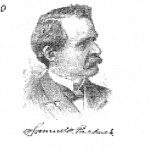 “PACKARD, Samuel Ware, was born at Shelburne Mass., Nov. 29, 1847, son of Theophilus and Elizabeth Parsons (Ware) Packard. He traces descent from Samuel Packard, who emigrated from Windham, Norfolk, England, to Plymouth colony in 1638, and was a resident of Bridgewater from 1660 until his death, about 1685…
“PACKARD, Samuel Ware, was born at Shelburne Mass., Nov. 29, 1847, son of Theophilus and Elizabeth Parsons (Ware) Packard. He traces descent from Samuel Packard, who emigrated from Windham, Norfolk, England, to Plymouth colony in 1638, and was a resident of Bridgewater from 1660 until his death, about 1685…
Samuel W. Packard at the age of sixteen went to Chicago to start out in life for himself. There, by the advice of a friend, Dr. Newkirk, he determined to study law, and shortly after became a student in the office of Baker & Tuley. He remained in this office about a year and a half, and when only seventeen years old began practice in justice courts; then after one year spent at Shelburne Falls Academy, in his native county, and at Williston Seminary, East Hampton, Mass., he returned to Chicago in 1866 to complete his legal training in the office of his former preceptors. On Aug. 16, 1867, he was admitted to the bar of the supreme court of Illinois, and in the following year formed a partnership with Col. John S. Cooper, which continued for ten years, during a portion of which time Judge Gwynne Garnett and William W. Gurley were also members of the firm. Mr. Packard’s rise to prominence was rapid. He began arguing cases in the U.S. Supreme court at the age of twenty-six, and the thoroughness with which he prepared his cases coupled with a very high order of legal ability, made him remarkably successful. For over fifteen years he spent more than half of his time in diligent study of his profession, thus becoming one of the best equipped lawyers at the bar. He collected the third private law library in size in Chicago, but finally disposed of it to the owners of the Ashland block, with the understanding that it should be kept in the building for the use of himself and the other lawyers having offices there. The high order of his legal ability, combined with a remarkable fertility of resource, renders him a dangerous antagonist in an important and complicated litigation.
Especially notable was his proceedure in the ‘Yankton Bond Case,’ which has become famous not only in the legal but in the civil and political history of the United States. Yankton county had issued bonds in $2000,000 for railroad aid, but after their sale the supreme court of the territory had declared them invalid. Mr. Packard being then retained by the bondholders carried the case to the U.S. Supreme court, where he succeeded in obtaining a reversal of the territorial court’s decision. In trying to enforce collection he found his way obstructed by certain special acts of the territorial legislature of Dakota, passed with a view to preventing taxes being levied to pay the judgments. Shortly afterward, in 1882, a strong effort was made to procure the admission of southern Dakota as a state, and large delegations visited Washington to urge the immediate passage of the pending bill. Thereupon Mr. Packard, recognizing the opportunity, prepared a protest to congress against the admission of the territory on the ground that as its legislature had aided and abetted an act of repudiation it ought not to be admitted to the sisterhood of stated until purged of this disgrace. By circulars and pamphlets, scattered profusely through all parts of the Union, he created so strong a sentiment in favor of his claim that it was found impossible to obtain a vote for the admission of the territory. The Dakota delegate informed his constituents that the bill could not be passed until the Yankton bond matter was settled, and advised the election of a legislature favorable to payment. As a result a refunding act was passed the spring of 1883, and the matter was adjusted; but it was not until Nov. 2, 1889, that the territory attained the dignity of statehood.
Mr. Packard is felicitous and clear in argument, thoroughly in earnest, never abusive of adversaries, and yet a foe worthy the steel of the most able opponent. Like his ancestors for many generations he is a strict adherent of orthodox Christianity.
He was married, June 23, 1874, to Clara A. Fish, of Lombard, Ill., and has three daughters and two sons.”
Source: The National Cyclopedia of American Biography, Vol. 10, James T. White and Co., New York, 1909, page 177

